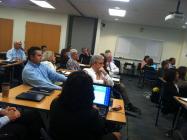Welcome to the second edition of our bimonthly e-newsletter, Workday@Yale, with news on the University’s transition to the campus-wide unified Human Resources, Payroll and Finance information system, Workday. Workday is a next generation business system that will enable Yale University to improve the delivery of business services across finance and human resources functions.
The Workday@Yale newsletter is one way we to keep you informed with insights and program updates. We are off to a great start and look forward to working with you and hearing from you. We welcome suggestions, comments, and feedback, so feel free to send them to us at Workday@Yale.edu.
-
View the program's Vision and Plan Roadmap
-
View the current Workday@Yale Program Team Org chart
What’s Been Happening?
Discovery Workshops
- What are Discovery Workshops? Discovery Workshops help the program team understand Yale’s current business processes and experiences, allowing the program to gain a deeper understanding of how things currently work and where there are opportunities for improvement. These workshops are designed to orient everyone involved to the current state of operations so that we can plan for the best transition possible. Community input is essential to the success of the Workday@Yale program and these workshops are an important channel for such input.
- How many discovery workshops have there been? A total of seventy nine sessions were held over six weeks, covering business processes across Human Resources (HR), Payroll and Finance. Over 400 community members attended the workshops and expressed that the sessions were very helpful to both the program team and community participants. The Discovery Workshop section of the website includes lists of attendees, brief descriptions of the workshops and presentations from the various sessions.
Service Groups
- What are Service Groups? Service Groups are community led focus groups that will help ensure that Yale’s new administrative processes meet the community’s needs and expectations. These groups are currently being formed and will serve as focal points for building a stronger community understanding of the Workday solution.
- New Service Group Director Announced. Effective November 1, Sandy Stein has accepted the position of Service Group Director within Business Operations. Sandy comes to this role as the director of Finance and Administration in the Department of Diagnostic Radiology, a position she has held for the past nine years. In addition to her administrative role overseeing operational and financial activities in the department, she has been an active participant in several Medical School and Business Operations committees, including the Operating Group, which advises university business processes, policies and communications. Sandy will lead and manage Yale’s new community driven service groups that will help to design business practices that optimize the delivery of high quality community focused administrative services for the Yale community.
Workstream Leads
- What is their role? Workstream Leads have been identified to help design, structure, and implement the Workday program. Workstream Leads provide day-to-day leadership for the teams that will execute the tasks of the program. These teams assume responsibility and accountability for the coordination and delivery of the program, lead the delivery of all functional aspects of the program, make business and financial process decisions, and assign dedicated staff members to various roles and responsibilities.
- Who are they? Workstream Leads include: Nancy Creel-Gross (HCM/Payroll), Lucy Lucker (Finance), Lourdes Reyes and Kathleen Broderick (BI/DW & Reporting), Darrell Cook (Technology), Karen Rossetti (Security & Controls), John Mayes II (Interim Change Management), Brent Dickman (Interim) and Sandra Stein (Service Group Leadership).
Stakeholder Analysis
- What is Stakeholder Analysis and why is it important? Stakeholder analysis is an organized method of identifying individuals and groups impacted by a change initiative or those who can affect its success. Stakeholder analysis will help lay the groundwork for targeted communications and training as well as determining what actions will be required to motivate individuals or groups through change process.
- How will Stakeholder Analysis be used? Yale Lead Administrators recently participated in a three-hour Stakeholder Analysis course, which was the first of several modules in the Change Leadership curriculum. The Change Leadership curriculum is specifically designed to support Lead Administrators in managing upcoming Workday changes in their organizations. In this module, participants received an introduction to Change Leadership concepts and in-depth instruction on Stakeholder Analysis methods as well as tools in an interactive, hands-on learning environment.
- Who will use Stakeholder Analysis? Each Lead Administrator was asked to complete an awareness and readiness assessment (Stakeholder Analysis) for their unit by October 31, 2013. The assessments are being used to inform the Program’s community engagement and communication plans. We’d like to thank the entire Lead Administrator core for their insights, participation and strong support of the Workday program. Kudos to our earliest responders, Donna Espenberg and Lisa Merola-Grimm, who returned their analysis within the first week!
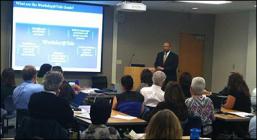
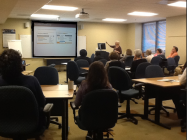
- Left: John Mayes, AVP Procurement and FBO Change Leadership & Communications, speaking about change leadership and how it ties into stakeholder analysis training.
- Center: Lead administrators receiving instructions for hands-on exercises during stakeholder analysis.
- Right: Nancy Creel-Gross giving a Workday update to members of the HR community.
Community Perspectives
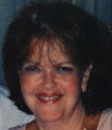
Jaci-Beth Ward, Associate Director, HR Business Solutions, and HR’s primary liaison for Workday@Yale commented:
“When asked why Yale is implementing Workday when our current system is seemingly working well, I respond by asking if they are driving the same car they drove 15 years ago. Most are not. Even if they were driving a 15 year old car in perfect working order, I’m sure that folks, without even realizing it, would be compensating for its shortcomings. Driving a brand new car, which is energy efficient and has state-of-the-art functionality, makes driving easier, less costly, safer, and more enjoyable. It is our responsibility to support our prestigious faculty in their mission to educate the best and the brightest, and how better to do that than to implement a system that will allow us to work smarter and increase our efficiency and thereby save money. Workday will enable us to reduce the number of steps it takes to get something done and eliminate the submission of paper forms for most Human Resources transactions while providing much needed information more easily. The Workday program is well-organized and moving at a quick, but manageable, pace which makes all involved energized and committed to the success of the program. And yes, Workday is fun!”
Conversations with Lead Administrators
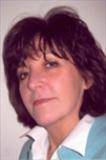
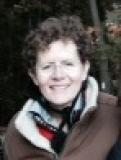
Change Management (CM) recently sat down with two lead administrators, Susan Wells (Left) and Priscilla Flynn (Right), on separate occasions to discuss current efforts around campus to enable Yale’s transition to Workday. As key players in prior Enterprise Resource Planning (ERP) and change management initiatives, Ms. Flynn and Ms. Wells offered valuable insight into Yale’s current transition. Not surprisingly, both demonstrated the commitment to excellence and innovation that is emblematic of their departments and of Yale’s many lead administrators.
CM: Tell me a little bit about yourself and about your work at Yale.
SW: I am the Lead Administrator at the School of Forestry and Environmental Studies. I started here the same day Kroon Hall opened in January 2009. But I had been at the university before in the controller’s office. During that time I worked on the most recent Enterprise Resource Planning (ERP), Project X, when we put in Oracle. In the intervening seven years, I was at Connecticut College where we also had a full-blown ERP project.
PF: I am a Lead Administrator for Microbial Pathogenesis at the School of Medicine. I’ve been here for about eight years. Prior to this, I was with a startup biotech company, and way before that I was in restaurant management. So I’ve been in management pretty much all of my life.
CM: What are you most encouraged about with the approach taken by Change Leadership versus other strategies used by Yale in the past?
SW: I’m most encouraged by the inclusiveness that I already see at this early stage. This new concept of using a service group structure, and not just the central process owners designing everything, is very different. I think it’s going to reap good rewards at the end of the project. The other thing, of course, is this rigorous stakeholder analysis process that’s going on. I know it’s going to have the benefit of us starting to think about who needs to be engaged and what possible opportunities and challenges might arise. But even beyond that, the stakeholder analysis meeting itself is a team building exercise, and getting buy-in from that core business office team will make them feel included, and as a lead administrator, I feel included. So I think that’s really smart. The whole buy-in concept is amazing.
PF: In general, I think this is the perfect approach for this place. And I think the university has put a lot of time in the last couple of years identifying what a lead administrator is, helping them understand their role and making sure they have training. This is the first time that I think they’re treating us like lead administrators because it’s our job. It’s our job to support the mission, lead change, and make these things work, and I don’t think it’s always been done that way. So I think this is perfect.
CM: What do you think would be some of the best ways to engage the community in order to create enthusiasm about the transition and to overcome any possible fear or resistance?
SW: Well, I think it’s just the basics. Communicate early and often. Address any adverse reactions by looping people in early and getting that buy-in. Make sure to under-promise and over-deliver. One thing that I think we sometimes run into, not just at Yale, but everywhere, is missed deadlines. That’s sort of a trust breaker. I understand that there are realities where if you’re running into problems you just can’t perform. But I think it’s important to regain the trust of some of the population and constituents. As I say, under-promise and over-deliver.
PF: In the school of medicine we have clusters, the basic sciences and the clinical groups, and those are monthly meetings and those are lead administrators. We’re support groups for each other. A lot of times in those clusters we help each other work things out. So not only are we building this network of people that can help with change, but we can also support each other during the whole process. I think everyone is actively engaged, I think everyone is excited about it, and I don’t think that they’re hesitant to change.
CM: Any additional pieces of advice you’d like to offer up to the Workday@Yale program or the Change Management team?
SW: I like the approach of using lead administrators to carry the charge, since we’re already those people around the university in our units to whom people look for guidance and to help explain what’s coming down the pike and what to know to do one’s job. And our business office staff people will help set a positive tone, too--they are amazingly dedicated and talented.
PF: You know not everything is going to work right. I’m hoping that we can have open conversations and say “You know what, maybe that one little piece isn’t right, and maybe we do let that go, or we change that.” So I think the lesson would be that it’s not all going to work and for us to be ready to admit it, move on, change something, or go with plan B.
CM: Any final comments?
SW: It’s early days, but I think that laying the ground work early is so important and so far I’m very happy and impressed.
PF: I think we all have to understand that when you’re hired into a management position you represent the organization as a whole. And what’s best for the organization is almost always best all the way down to the department level and to the people level. I think people forgot that, but I try to always keep that in mind. It’s hard sometimes because you’re pulled from both sides, but you have to remember that that’s what your job is, that’s what you were hired for, and that’s why you went into management to begin with.
Did You Know…Workday uses a leading-edge technology technique called "in-memory" processing, where the entire application and all of the data are loaded into resident memory. This helps Workday achieve lightning quick response times, even when performing complex business processing or accessing large volumes of data.
QUOTE of the DAY
“I have been impressed with the urgency of doing.
Knowing is not enough. We must apply.
Being willing is not enough. We must do.”
-Leonardo da Vinci
